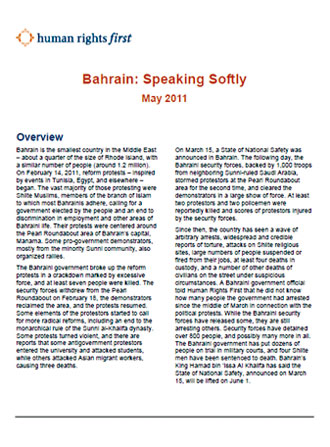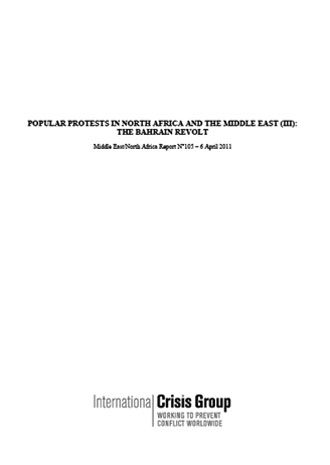
|
 |
 |
|
|
|
|
|
|
|
|
|
|
|
|
|
|
|
|
|
|
|
|
|
|
Concerns Over Human RightsHow Can Bahrain Reassure
|
|
The main reason for this is that government insititutions have not dealt well with the causes of international concern. Instead, they frequently discussed subjects which are unrelated to the issues raised in the reports of human rights institutions.
International human rights reports contain specific points, which should be responded to and explained by the officials responsible. These organizations have a limited interest in the political and security situation in Bahrain unless it provides a contextual framework for their work. For example, presenting the issue of human rights as a secondary appendage to the political and security situation will not calm the anxieties of human rights organisations whose main concern is to what extent are human rights being respected in the context of the political reform project.
Also, focusing on the violations committed by the Opposition and its followers cannot replace addressing the specific violations presented in the human rights reports. Some organizations might even consider the Government approach as an attempt to justify its own abuses when the main issue of human rights is ignored in favour of lengthy explanations of the political and security situation.
Sometimes government officials do not answer the questions of human rights groups directly. For example, when a human rights organization asks why a certain detainee was not allowed to have a lawyer, the ideal response would be to provide them with documents proving that the detainee was given this right from day one, and that investigations were conducted in the presence of a lawyer. What happens instead is that the concerned authority provides the organisation with documents detailing the charges against the detainee, which they already have. These organizations are primarily concerned with evidence that trial procedures are being conducted in accordance with the standards of a fair trial, from the beginning of detention until the passing of the verdict.
The general answer given about detainees is that they were dealt with in accordance with the Law, which is an insufficient response to a question that requires a specific and documented answer. The primary concern of international human rights organisations is to ensure that local laws conform with the international human rights conventions that Bahrain has signed.
In other occasions, these organisations inquired about government procedures and were presented with incomplete answers. The dismissal of workers is a case in point: the Government said these workers were absent from work without any legal justification and thus caused financial damages in both private and public sectors. However, the same law according to which these workers were dismissed contains legal assurances, which prohibit arbitrary dismissals and provides the right of appeal, including the use of an independent body to ensure that the dismissals were not arbitrary. Furthermore, even after the dismissals, what are the employee’s rights, based on this same law? And was it applied at the time? If the dismissals in Bahrain had been limited to a few persons, this issue would not have constituted a big problem, but when hundreds are being sacked in a short period of time, the observer’s first impression would be that there was a systematic policy in this regard.
|
Countries distrusted by international human rights organizations are repeatedly required to provide evidence that they are acting according to human rights standards. Providing general answers, citing local laws or half measures are all unacceptable.
International organisations remain apprehensive for these reasons, and have expressed their concern in various reports, including those released by International Crisis Group, Freedom House, Doctors for Human Rights, Human Rights First, Amnesty International, Reporters Without Borders and the UN High Commissioner for Human Rights.
In order to calm these fears, government bodies should first scrutinize the causes for concern outlined in the reports and then consider their suggestions for remedial measures. Verbal pledges and assurances are insufficient, especially when human rights organisations see that they do not correlate with the decisions and procedures implemented on the ground. It is important to note that some of these suggestions are inaccurate and unrelated to the issue of human rights, or contain unnecessary procedural details.
Concerns:
- Insufficient steps to stop the discourse of hatred and sectarianism in the media.
- Restrictions on peaceful gatherings.
- Restrictions on human rights activists to do their work freely, and the detention of many.
- Refusal to adhere to the standards of a fair trial and continuing to use ‘National Safety Courts’.
- The deaths in custody of a number of detainees.
- Restiricting freedom of expression, detaining some journalists and dismissing others.
- The deaths of a number of protesters, shot by the security forces.
- The detention of a number of Opposition leaders and workers.
- Allegations of the torture of detainees.
- Detention of many doctors and nurses.
- Cessation of scholarships, both inside and outside the country.
Recommendations:
- Conduct independent and transparent investigations into human rights abuses in Bahrain and holding all those responsible accountable: from the individuals who gave the orders to those who carried them out.
- End discrimination.
- End the harassment of human rights defenders and release those detained.
- Release all those detained for practicing their rights of peaceful expression and assembly.
- End arbitrary arrests.
- Investigate allegations of torture and ill-treatment, activate guarantees to prevent torture such as putting an end to solitary confinement and guaranteeing the rights of detainees to have visits and lawyers.
- Protect places of worships and respect the religious freedoms of all Bahrainis.
- End the arbitrary dismissal of workers and take the necessary procedures to reinstate them as soon as possible.
- Guarantee a fair trial for criminal cases before civil courts where all the conditions of a fair trial are provided and put an end to emergency courts.
In order to address the concerns of the international human rights community, officials in Bahrain can adopt a different approach in dealing with the contents of these reports, by correcting any mistakes when they occur and providing documentation to support this. The Government can also deal with the accurate cases mentioned in the reports, and then inform the organizations of any corrective measures. This would help build trust, and prove that it is serious about respecting human rights as well as providing the opportunities for individuals to file complaints.

